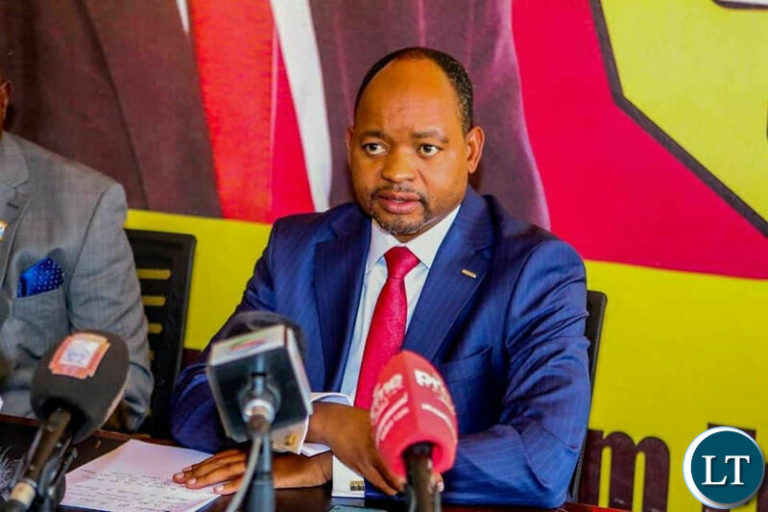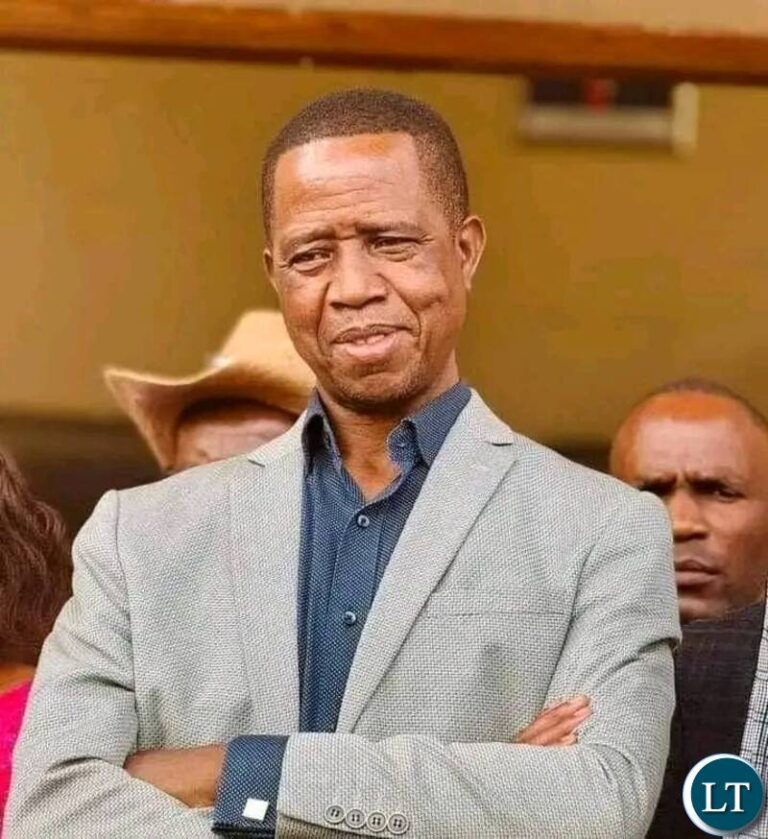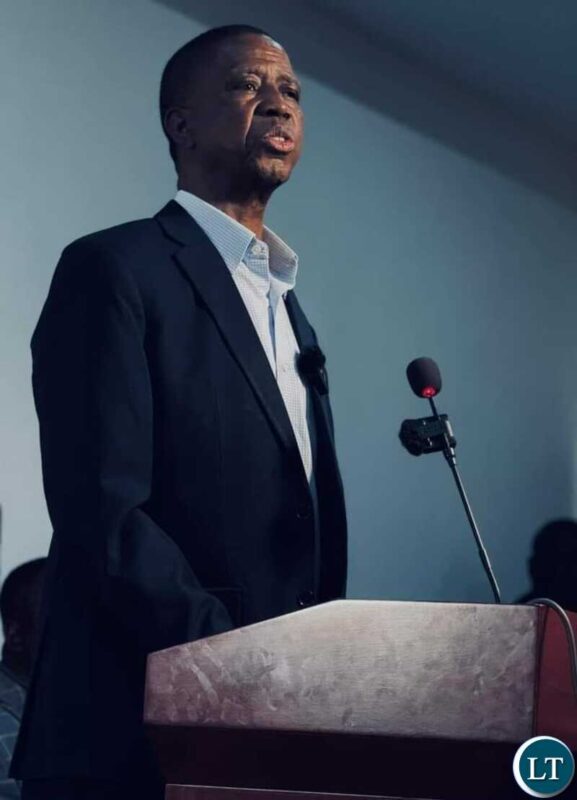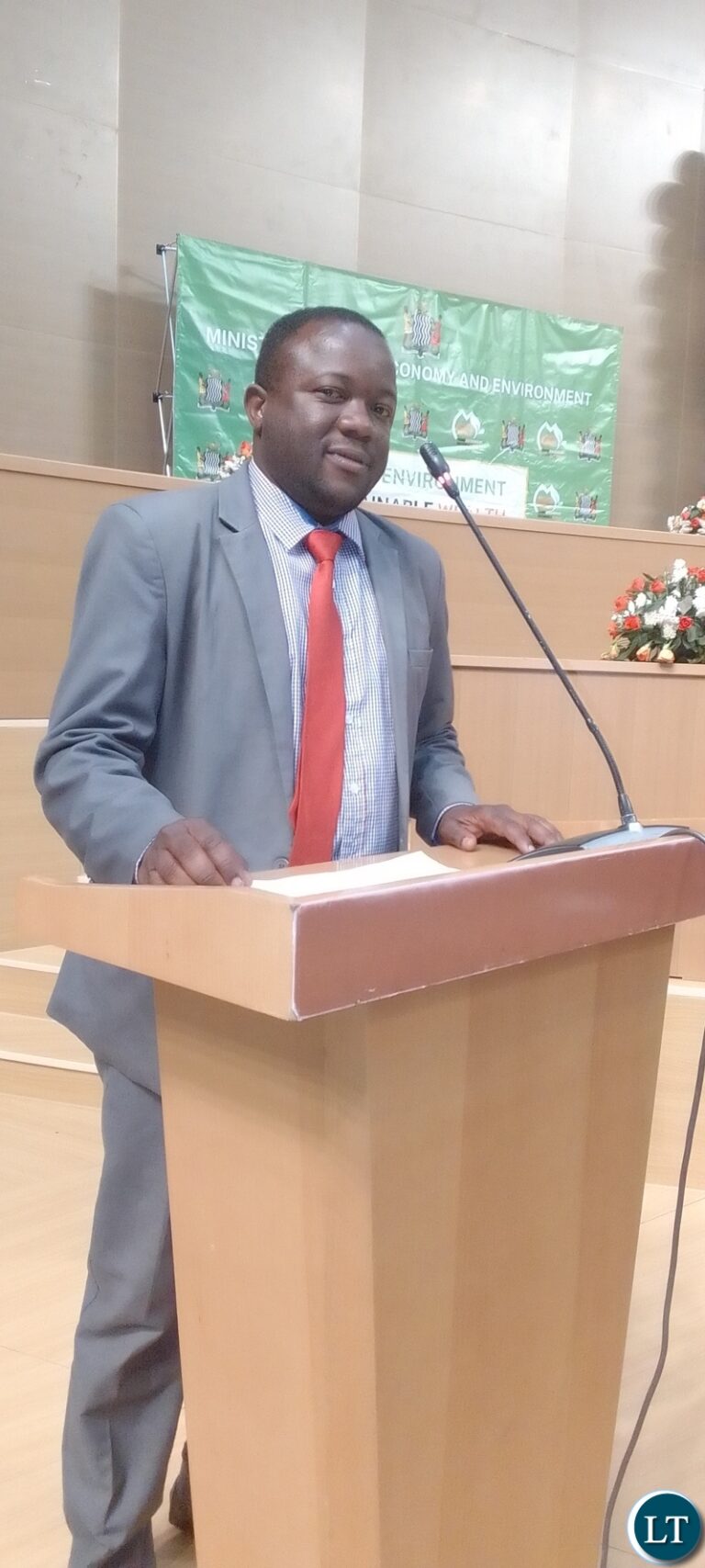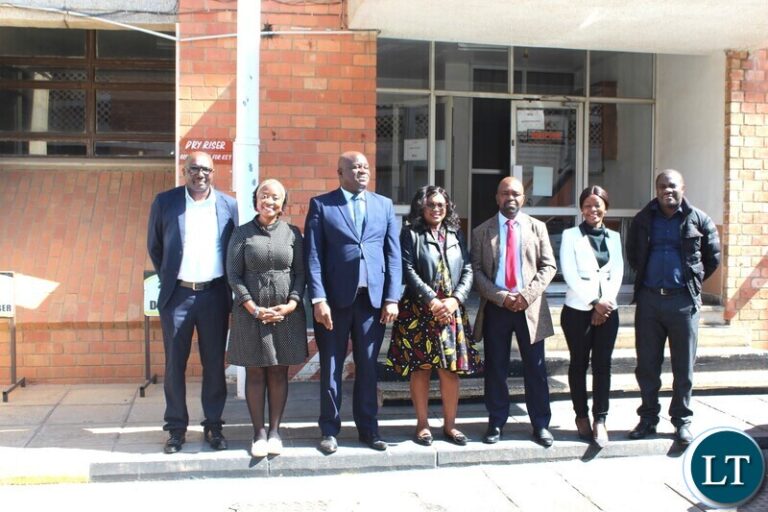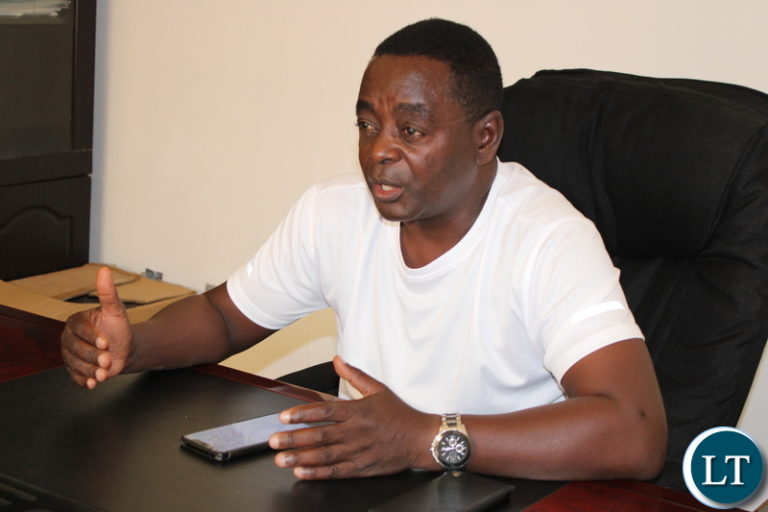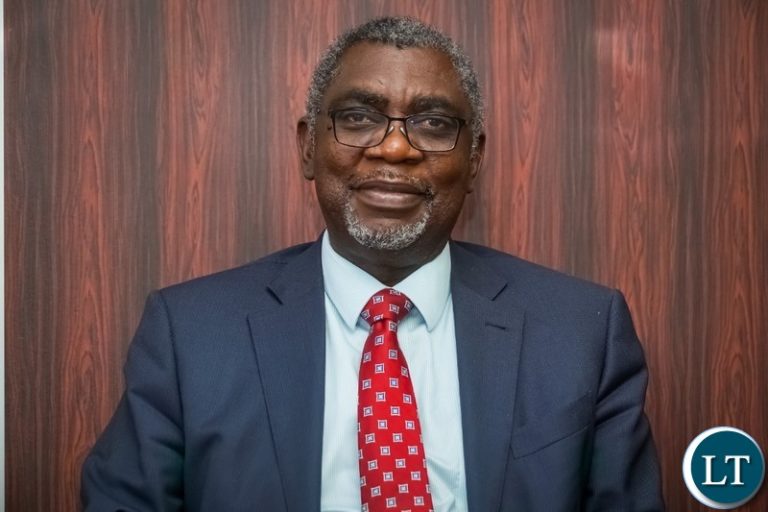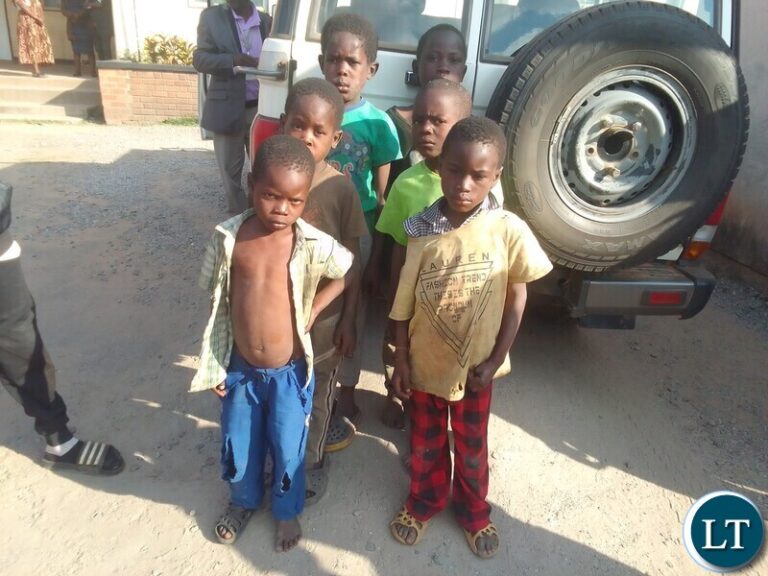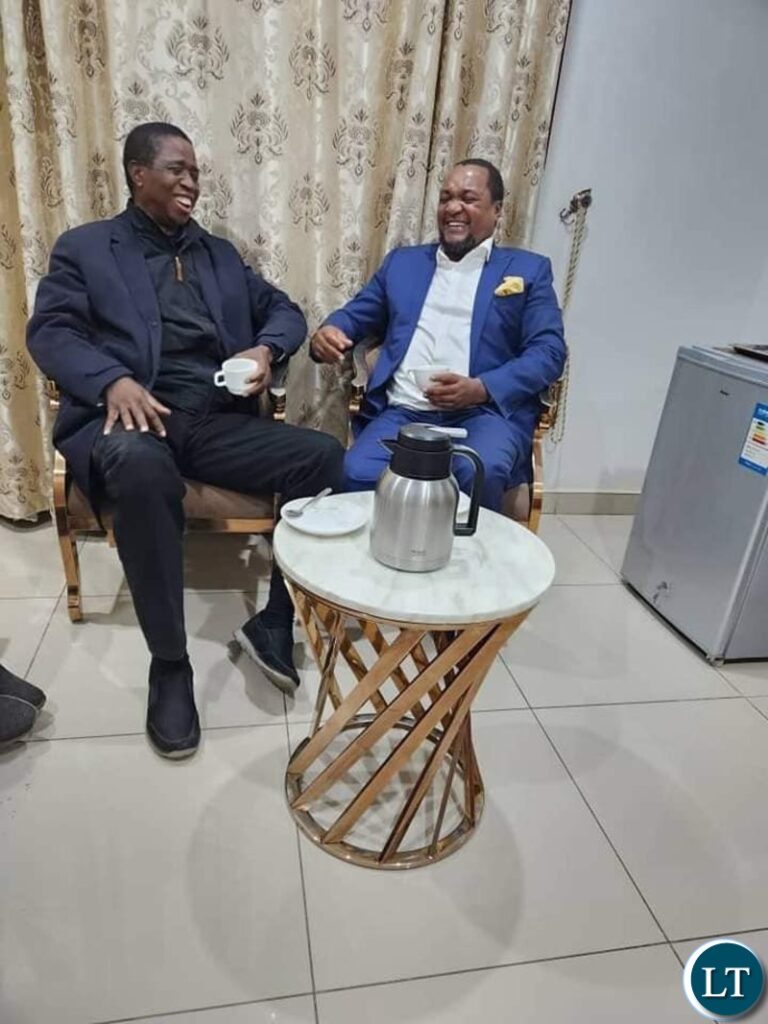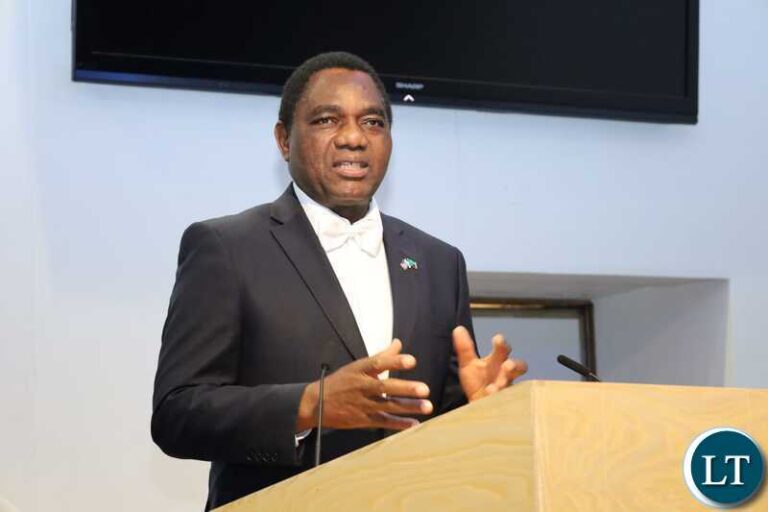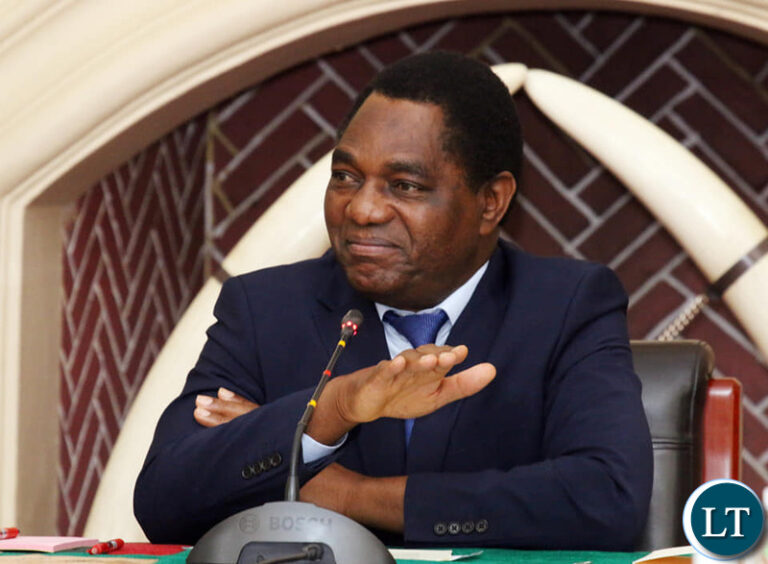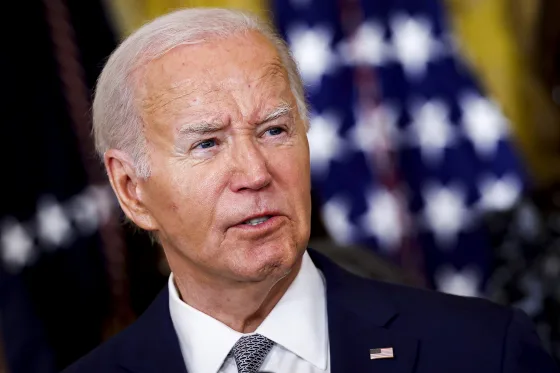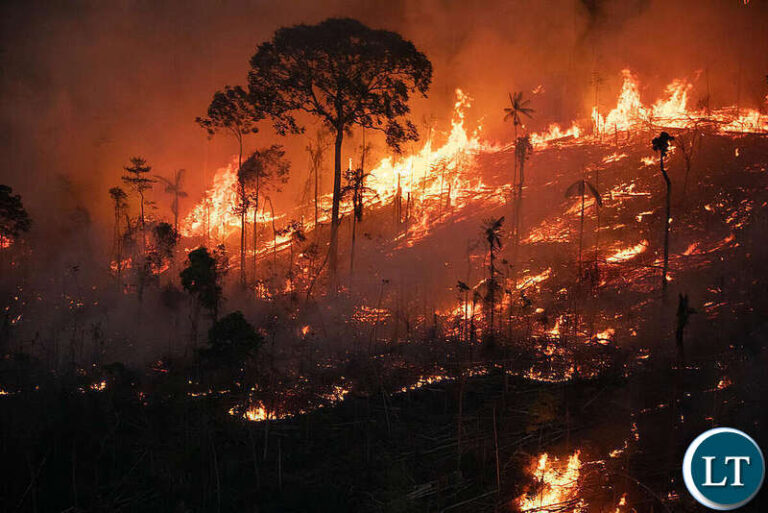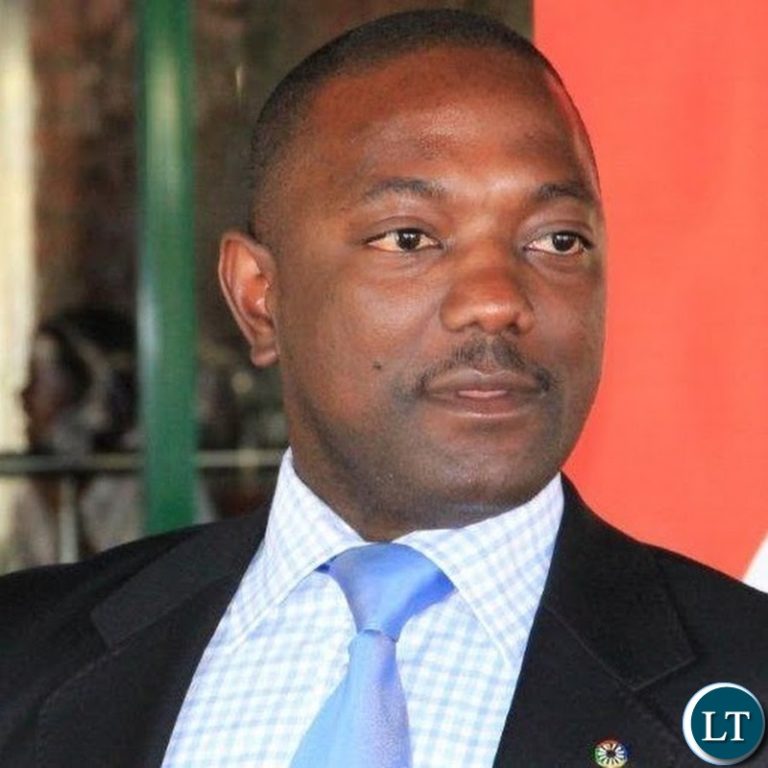Chief Government Spokesperson, Cornelius Mweetwa says former President Edgar Lungu has no moral standing or merit to claim that he is a defender of the Constitution when he committed some of the most brutal attacks during his tenure.
Mr Mweetwa who is also Minister of Information and Media said it is shocking that Mr Lungu during a media briefing described the current Constitution, which was ushered in during his tenure, as celebrated and admired in the region when he is aware of the many lacunas it has.
Speaking at a media briefing in Namwala today, Mr Mweetwa said claims by Mr Lungu that his legacy is anchored on ushering a constitution which is admired by many citizens and celebrated nationally and regionally are unsubstantiated.
Mr Mweetwa said what people remember is that his legacy is anchored on violation of the rule of law and the promotion of political violence and caderism.
Meanwhile, Mr Mweetwa said the United Party for National Development (UPND) administration has no part in the loss of parliamentary seats for the nine Patriotic Front (PF) Members of Parliament (MPs) saying what the former ruling party is going through are self-inflicted injuries.
He said Parliament had to declare the seats vacant in line with the Constitution and not the UPND.
Edgar Lungu has no moral standing – Mweetwa
Statement By Former President Edgar Lungu
Fellow Citizens,
We are a proud sovereign state that is governed by a written constitution since independence. For the past 60 years, Zambians have consistently fought to establish and entrench democratic rule and good governance by amending and strengthening our constitution.
In 2016, I was your Republican President who approved comprehensive reforms to our constitution we all celebrate today and many admire in the region. Out of all the seven presidents, everyone know that Progressive constitutional reforms is my political hallmark and leadership legacy. Therefore, as long as I am alive, I will not abrogate my national duty to defend and protect our cherished democratic Republican Constitution. Moreover, there is no man or woman in Zambia or abroad who is bigger or above our Republican Constitution!
Under our supreme national law, our democratic rule is anchored on the principle of “separation of powers” with four clear fundamental objectives and functions. The four pillars of separation of powers are:
1. To set limits on the work of the Judiciary, the Legislature and the Executive so that each of the three operates within their own autonomous space and respective jurisdiction;
2. To ensure that there is no overlap in the powers and functions of these three different arms of government at any given point;
3. To provide checks and balances on each other in order to guarantee the rule of law, accountability, transparency and consolidation of democratic principles; and
4. To prevent abuse of power by any of the three arms of government and thereby protecting sovereignty, citizen rights, national security and peaceful coexistence.
For the past three years since President Hakainde Hichilema came into power, we have seen a structured and coordinated campaign to undermine and erode the principle of separation of powers. Most stakeholders have factual stories of gross interference by the executive into the judiciary and legislature. On Wednesday, we saw our parliament making history by expelling 9 PF MPs. As Former President, I can tell you that this gesture is the highest level of political brutality and unacceptable barbarism.
Today, I join millions of Zambians to mourn for the death of “separation of powers” in our country. The moment any of the three wings of government the (legislature, judiciary and executive) accept to be arbitrary abused or overthrown by the other, then citizens must declare a nation mourning for the funeral of “Separation of Powers”.
As everyone is aware, I was Republican President between 2015 to 2021. There was no time I called or met the speaker of the National Assembly to instruct, impose or arm twist him because I respected the principle of separation of powers. You can ask our former speaker, Dr. Patrick Matibin, he is still alive and around. Unfortunately, this type of respect for separation of powers we practiced under the PF and previous ruling parties has been washed away by this UPND government.
Consistently, we have seen the integrity of parliament being undermined and eroded with political impunity. The respected office of the speaker has been openly arm twisted many times to rubber stamp or endorse oppressive political actions of the executive against MPs and government critics or political rivals.
Ladies and gentlemen, if Zambians will not stand up to oppose and reject the illegal, immoral and unconstitutional expulsion of the nine PF MPs, then our citizens would have approved the brutal assassination of “Separation of Powers” by the UPND government. Our media friends here can ask former Deputy Chief justice Marvin Mwanawamwamba who is still alive and was at the top of the judiciary when I was in state house. We never interfered or gave instructions to the judges. Respect for the rule of law and separation of powers was very important during my time in office!
For our affected MPs, I feel your pain, and I feel your anguish because you were democratically elected to save your people and Zambians. However, l promise and commit to fight with you. We will do everything possible both politically and legally to ensure that dictatorship does not win over democracy. As far as the law and democracy is concerned, you are still our MPs and you shall go back to parliament in the name and spirit of rule of law and democracy.
In every sector, there good and bad seeds. As such, we sympathize with some of our independent and professional judges who are doing everything possible to professionally and independently serve the Zambian people. I know we have some sound and credible judges who still defend Justice and fairness for our people. To such, I want to promise you that “a better Zambia is coming where you will once more work independently and freely.
In future, we promise to restore rule of law as well as separation of powers. With our experience in government and a bigger and better team before us, we shall reverse this dangerous political vice set by the UPND government.
As I said in Kitwe, l am back and back in a better way. I have been tried, tested and I strongly believe I am now more trusted for national leadership. Our future government will be inclusive as you have seen our UKA family. I call upon everyone across Zambia to voluntarily join hands us to fight, defeat and democratically clash this dictatorship regime called UPND government. We pray to God that soon or later, Zambians shall have an inclusive government that hates tribalism, nepotism and regionalism and through our inclusive coalition alliance.
For me as a political father for all Zambians, l am ready to engage and embrace anyone who errored or went astray to come back to PF. Hon. Miles Sampa is one of the best examples we must all embrace and support. He is one of us and belongs to us! PF is our party, and we must all work together to restore it as one family and bring on board other partners.
May God bless you all and thank you
Dr Edgar Chagwa Lungu
Sixth President of Zambia
PF President
NKONDO YAMU BONGO: The Battle of the Extremes and the Stigma Associated with Mental Health-Part 1
Men’s mental health is underrated and overlooked, most think they are strong but they are not.
This personal account highlights the author’s struggles with mental health, depression, and anxiety, which were exacerbated by various factors such as financial challenges, unemployment, toxic relationships, and a lack of support. The author shares their experiences, including hospital visits and counseling sessions, to raise awareness and encourage others to prioritize their mental well-being. The article emphasizes the importance of seeking help, breaking the stigma surrounding mental health, and fostering a supportive environment for healing and growth.
“When God wants to punish a dog, he removes its sense of smell; when he wants to punish a human, he removes their sense of shame.”
Depression, anxiety, and other mental health challenges are more prevalent now than ever before. Today, I want to share my experience as a mental health patient to raise awareness and help others avoid finding themselves in a similar situation. Life has thrown challenges at me like a baseball, and the devil has been hitting home runs. But, like the scene in the story of Jesus when the ship was under the storm, all the disciples needed to do was shake Jesus up for him to calm the storm. My recollection of events and clarity is a manifestation that resilience through the right mindset can deal with depression and anxiety even under the greatest opposition.
Understanding Mental Health
The brain is the most vital organ in the human body. It must be taken care of just like you must take care of your body. Just like you must brush your teeth, it’s important that your brain is placed in a supportive environment rather than one which keeps it under unnecessary stress for prolonged periods of time. We must feed the mind with affirming thoughts and read that which we want to be our output. Just like in boxing, where you must protect yourself at all times, it’s crucial to be vigilant about toxic relationships and behaviors, both from yourself and your environment. Yes, I am a mental health patient. I have been to Ndola Psychiatric Hospital and Chainama Hills Hospital since 2020. But how did I get here?
The Roots of My Depression
I attribute my depressive state to several factors: extended financial challenges, unemployment, toxic marital and family relationships, and a lack of a support system.
In 2019, I was employed as the manager for Kawambwa District Cooperative Union under the support of the Ministry of Agriculture and the International Fund for Agricultural Development. Initially, it seemed like a great opportunity for professional growth. However, things quickly turned negative. After the first two months of receiving my salary (June and July), the funding stopped, and we were not paid from August to December 2019. I had to borrow money from loan sharks to survive, taking a loan of 5,000 kwacha at a 50% monthly interest rate. My salary was only 6,000 kwacha. Despite not having funding, I mobilized the cooperatives to supply 90 tonnes of maize to a milling company in Kapiri District called Kamunda Milling. Unfortunately, the said milling company did not pay in accordance with the time in the contract and delayed, but suffice to say, 270,000 kwacha was deposited into the account of Kawambwa District Cooperative Union. Unfortunately for me, my contract of employment stated that my salary should not come from the transaction account of the union. It was strictly for the cooperatives; commingling of funds was not permissible as a separate account for salaries and statutory fees had been opened. The project was meant to improve the operations of the cooperative union and not disturb its financial situation in any way. This was cast in black and white, and as such, the cooperative officials were tied. By December 2019, the funding for salaries had not come, I was drowning in debt, and with no funding in sight, I resigned.
The Lack of Support
As a man, I needed to be the leader and provider for my immediate and extended family. However, under the circumstances, this obligation was far-fetched for that moment.
Unfortunately, my spouse was not supportive. She declared that all her finances were directed towards her training in China by her employers—a trip marred by unfortunate events and postures that do not respect the institute of marriage. I had to navigate the tough terrain of debt and survival in Kawambwa alone. At one point, I stayed in a village. In January 2020, after handing over my responsibilities, I returned to my wife’s house to restart my life.
The First Homerun
Upon reaching Ndola, I found that my spouse had gone for military training, and command had appointed her friend to stay as a caretaker. I was expected to live with her friend. I objected to this unreasonable arrangement and politely asked her to leave on principle.
Meanwhile, my son had been moving from Kabwe to Solwezi without my consultation, and my family on the other side failed to communicate. He had to stay with my sister-in-law, and I had no problem with that as it was the best decision at that moment. I had hit rock bottom and needed a plan. I decided to look within and formulate a more stable and reliable source of income. While confined in KSQ3 Kansenshi Prison camp, time was of the essence. I was failing in my role as a father. I came up with the idea of F(A+C+T+A+R) based on my strengths in forestry. I wrote project proposals targeting the Citizens Economic Empowerment Funds under the Industrial Yards, but that proposal, though approved, did not go through to this day. I also did research to find a solution for wooden utility pole maintenance and submitted it to ZAFFICO, ZESCO, REA, the Ministry of Energy, and ZICTA, as optic fiber is mounted on wooden utility poles, but that did not work out. Despite the dark and foodless environment, my veterinary colleagues in Ndola visited me, offering support and noticing the deteriorating state of my health. They pointed out that my spouse should be supportive, but she wasn’t. She claimed her salary was directed towards military training again, so she had no means of providing support.
One of my veterinary colleagues observed the toxic environment I was living in and offered to take me to Lusaka to stay with my parents. However, my parents castigated me and told me not to run away from my home. Out of respect, I returned to the toxic environment.
The Second Homerun
While my spouse was training in Kabwe, it was time for her cohort to travel to Western Province. She found time to visit Ndola, arriving with a laptop bag. Her attitude was dismissive, and she exhibited a fake military bravado. I kept my composure and continued writing my articles in hopes that the storm would settle down.
The next morning, I had a client meeting for a forestry project. I decided to use her laptop bag to look organized. To my surprise, I found contraceptives inside the bag. This discovery was profoundly depressing, confirming the rumors I had heard from neighbors. I abandoned the client engagement, feeling utterly hopeless. For the first time, I felt so low and exhausted. My spouse left the next day, unconcerned. This marked the beginning of dark days and bright nights, where I slept during the day and worried through the night.
This is the first time I started experiencing the battle of the extremes, the extreme high as in feeling happy and extreme low when I looked at my situation. Trying to find equilibrium was a challenge.
The Third Homerun
Financially, I was struggling until the Zambia Correctional Service pass-out was held somewhere around June 2020. I was not invited, and I felt embarrassed when I heard about it from neighbors. My family advised me to stay put, but navigating Ndola without money was incredibly tough. My mental health deteriorated further, and I began experiencing memory losses, staying awake for up to four days at a time. To cope, I started writing everything in my journal so that when I eventually fell asleep due to medication, I wouldn’t lose my train of thought. I visited the mental hospital, and the counselor at Ndola Psychiatric Hospital looked at my situation through my journal. She said, “I see you have strength in writing, why don’t you focus on writing articles in forestry. Keep your mind busy. Instead of dwelling on all these negatives, why don’t you write an article in forestry, identify a problem, and offer solutions? Do something that makes you feel accomplished.” She challenged me to bring her an article at the next counseling session, which we could review together.
One Saturday, I was invited by my friend to watch a football game at the Indeni Sports Complex between ZESCO and another forgettable team (one ZEGA). My nephew, Mwila Phiri, was playing for ZESCO, and I wanted to watch him live. We sat in the terraces. That’s when I noticed the wooden terraces were defective. I took pictures (extremely happy) and jotted down some notes on my phone. ZESCO won. When I reached home, I found my spouse in the garden on the phone. I arrived and sat in the living room. All I could do was lift my lion cub (Gonjetsani-Mwana wa Nkalamu) and kiss him. “No sweets and no biscuits for now,” I said in my heart. As I watched TV, my spouse came into the house from the garden, still on the phone. After 29 minutes, she was still on the phone, and I noticed the conversation was with a man. I retired to our bedroom to avoid the irritating behavior and potential conflict. I sat on the bed and felt sad (extreme low). I started brainstorming ways to remedy the situation, and before I knew it, the Roman Catholic bell rang. It was 6 PM, and my daily routine of escaping home had to begin to head to the library. At one point, the librarians noticed that I used to sleep a lot in the library. I explained that I found the place peaceful. I also told them I took medication to help me sleep and showed them the amitriptyline. The effect of that medication is dizziness.
Anyway, I took action regarding the hazard the defective wooden terraces posed to the fans and wrote to the Ndola City Council and the Engineering Institute of Zambia. As a result, they removed the defective terraces and opted for better and safer options. We celebrated this achievement – it was a goal for both me and the psychiatric counselor.
The Fourth Homerun
When my spouse returned, she treated me with a military attitude, often calling me a civilian to imply I was less of a man than those in uniform. She would allow phone calls at odd hours, and sometimes men in uniform would visit, and she would cook for them but not for me. This was a harsh reality for me. At the time, COVID-19 was at its peak, and it worsened my depressive state. I had to drag myself to the hospital for help.
Given these circumstances, finding a job was impossible. I had no financial support, and my spouse was untouchable, keeping herself isolated from me. I was essentially hopeless. To reduce stress, I started leaving KSQ3 Kansenshi Prison early in the morning to go to the council library in Ndola town, returning only around 8 PM.
At some point, I noticed my spouse was pregnant. She informed me via text, and I was shocked, given our strained relationship and her interactions with other men. Disrespect peaked when an officer called her at an inappropriate time, asking about his baby. I had had enough. On April 28, 2021, I was arrested at Kansenshi Police Station for Gender Based violence. The other man in the conflict went Scott free till this day. I hope authorities look at such situations and adress this Room 18 scenario so that all parties are punished equally. Throughout her pregnancy, my spouse never involved me in antenatal visits, preferring to have other officers accompany her instead. To this day, I deny the pregnancy, as her actions and behavior do not align with the truth.
The Fifth Homerun
Since my last employment in Kawambwa had not paid me my dues as of July 2020, loan sharks began threatening my life and that of my family. These threats in Kawambwa are not just words; they can be acted upon. I pleaded with the director of cooperatives, Mr. Mungalaba, for help, and eventually, the payment came through. However, my debt had accumulated significantly. I called a meeting with the loan sharks, paid them proportionately, and asked for debt cancellation, as I was no longer working. They agreed, but the stress from my spouse’s behavior persisted.
The Sixth Homerun
I discovered my spouse was pregnant through a text message. Given our strained relationship and her inappropriate behavior, I was shocked and dismayed. Her lack of communication and emotional distance continued throughout her pregnancy. She preferred communicating with others over me, further isolating me emotionally. This caused a rift at home and added stress to my life.
The Seventh Homerun
Throughout our marriage, my spouse’s infidelity and inappropriate behavior were constant issues. I intervened in multiple situations involving her relationships with other officers, which often led to conflicts. The strain on our relationship was immense. At one point, there was a rumor that my spouse was confronted by a warder over an officer in charge with whom she was allegedly having an affair. I can verify this allegation. In fact, in 2018, I was informed that the man had visited our house at night. I started from Lusaka to confirm, but unfortunately, I had an accident. That same week, Carristo Chitamfya lost his son.
The Eighth Homerun
A week before August 2021, my spouse started packing my bags and throwing them into the passage. When I confronted her, she replied cryptically. I left the house, walking toward town, but my uncle Salama called me, questioning our living situation as she had called him, accusing me of all sorts of things. This was depressing. I explained the turmoil caused by my spouse’s actions, and he sympathized. Throughout my stay in Ndola, I faced unjust accusations and trials by my spouse, but she could not resolve the issues. The intrusion of men and disrespecting boundaries were seen as my fault, but I hold to the standard that a man should respect another man’s house, whether it’s a hut, one-room, two-room, or mansion. Anyway, upon returning home, I questioned the motive of calling my relatives to tarnish my name. She ran outside, and a few minutes later, her elder brother arrived, accusing me of mistreating her and suggesting I leave. Frustrated with biased family discussions, I called a neighbor, Bashi Papa, to witness the situation. However, he refused, stating it was a family matter. Her brother declared that our wife’s family didn’t want me there. I respected their decision and left on August 9, 2021, with only my laptop bag.
As of July 3, 2024, I have never been contacted by the family, and the child I recognize has been kept away from me.
This weighs heavily on me. I have tried to maintain my composure, but I have been alerted that there has been a smear campaign to tarnish my name, potentially to justify certain people’s desires.
Indeed, I am a mental patient – I mean, I am supposed to be. The things that have been happening to me are not normal; I am supposed to be disturbed. Pretending to be normal when faced with such immense challenges is not correct but a fallacy.
I am proud to go for mental health check-ups – 95% of my visits are for counseling. I am not the type who would consider suicide. I have goals, dreams, and a future. I am not a tree. I am a man; I can change direction.
My journey with mental health challenges, exacerbated by toxic relationships and financial struggles, unemployment, highlights the importance of awareness and support. It’s crucial to recognize the signs of mental health issues early and seek help. Breaking the stigma around mental health is essential for creating a supportive environment where individuals can heal and thrive. By sharing my story, I hope to encourage others to prioritize their mental well-being and seek help when needed. Remember, you are not alone, and seeking help is a sign of strength, not weakness.
Over the past three years, I have been to the mental hospital, mostly for counseling. I have met teachers, police officers, and even housewives in our support groups. Unfortunately, I have witnessed four cases of suicide: two from colleagues we met at Chainama, one from Chelstone Bazaar this year, and most recently, a colleague from ZAMRA, Steve. Steve was a support system for me while in Ndola, providing emotional, financial, and companionship support. I was thus surprised and saddened to learn that Steve is no longer with us due to suicide.
My philosophy is that mental health can affect any one of us. We all have different breaking points; what might be manageable for you could be overwhelming for me, and vice versa. Regardless, the bottom line is: don’t give up.
In fact, between a problem and me, the problem should be resolved, not me – I will go to Chainama or any psychiatric hospital as many times as necessary to save myself and resolve the issues.
Go ahead call me mad, but am not nima pressure chabe.
#LION UP
Chaliafya Katungula
F(A+C+T+A+R)
#inspired by real life events # living testimony
ZCSA pledges to safeguard consumers from unsafe products
The Zambia Compulsory Standards Agency (ZCSA) says it remains committed to safeguarding consumers
from unsafe products.
This is because unsafe products pose a risk to the health of consumers.ZCSA Acting Inspections Manager – Import Quality Monitoring Kasuba Kasengele made remarks on July 4,2024 when a team of Police Officers from the Intellectual Property Unit (IPU) Lusaka Division called on the ZCSA for a meeting aimed seeking possible areas of collaboration.
Mr. Kasengele said the Agency regards the Police as a critical stakeholder in enforcement of compulsory
standards.He said ZCSA is mandated by section 5 of the Compulsory Standards Act No. 3 of 2017 to cooperate with Government Ministries, state institutions and international organizations in enforcing compulsory standards.
Mr. Kasengele says the police, being law enforcers, can complement the Agency's efforts on matters relating to understanding of Intellectual Property.
He acknowledged that the Police are endowed with competent skill set that are valuable in the Agency’s
quest to carry out the mandate of enforcing Compulsory Standards.Mr. Kasengele expressed hope that the collaboration between ZCSA and the IPU will yield positive results in as far as protecting consumers is concerned.
He commended the Police Command for allowing the team to visit ZCSA in an effort to appreciate the
mandate of the Agency.Zambia Police Lusaka Division Deputy Officer In-charge Intellectual Property, Hellen Hikanza said discussions around IP are important as they border on protecting the nation’s economy and consumers.
Ms. Hikanza said no investor would be willing to invest in a country which does not have laws to protect
their Intellectual property because their investment would not be protected from exploitation.
She pledged her unit’s resolve to closely work with ZCSA in ensuing that only genuine products are
supplied on the Zambia market.
Issued by:
ONISHIAS MAAMBA| PUBLIC RELATIONS OFFICER
Zambia Compulsory Standards Agency
Zambia’s democracy is in ICU under HH – Steve Chungu
FORMER Government Chief Whip Steve Chungu has charged that Zambia’s democracy is in the Intensify Care Unit under President Hakainde Hichilema’s administration.
Speaking in an interview Mr Chungu said the political happenings in the country were very worrying and a serious threat to democracy.
Mr Chungu who is also former Luanshya Constituency Member of Parliament said the recent nullification of nine Parliamentary seats held by the Opposition Patriotic Front (PF) by the speaker of the national assembly is a serious indicator that the growth of democracy in the country is under threat.
“Our democracy is in the Intensify Care Unit under Mr Hakainde Hichilema’s administration,” Mr Chungu said.
He said attempts by the UPND Government to turn Zambia into a one party state will not work saying that Zambians are fully awake politically.
Meanwhile, Mr Chungu said the reconciliation between Matero Constituency Member of Parliament Miles Sampa and former President Edgar Lungu is welcome.
” I think to me, the reconciliation is welcome if it has been done sincerely, what Miles has done that is what any normal human being should do,” Mr Chungu said.
He said Mr Sampa has demonstrated that what he did to the PF was not right adding that the former ruling party is for every Zambian.
He said the stance taken by Mr Sampa to reconcile should be applauded by every well meaning Zambian.
” We must live as one and we must have the heart to forgive one another regardless of our political differences,” Mr Chungu said.
Africa’s Tax Agenda in Combatting Illicit Financial Flows: From Words to Action
By Albert M. Muchanga
We have done a lot of talking about illicit financial flows from Africa.
It is now time to move from words and act.In this respect, I invite us all to come up with a scorecard to asses the impact of our actions in eliminating illicit financial flows from Africa.The issue of domestic resource mobilization is becoming increasingly important in this current environment of unsustainable debt levels, decline of official development flows in real terms, low foreign direct investment flows to Africa on account of perceived high risks, disruption of global supply chains; and, among others, emerging geopolitics.
In this environment, we must develop capacities to increase tax collection as a percentage share of
Africa’s Gross Domestic Product, which is the lowest in the world.
We must also overcome mispricing which a major contributor to illicit financial flows from Africa.
Equally important, we must overcome base erosion and profit shifting by multinational corporations.
Furthermore, we must overcome smuggling of some of Africa’s natural resources like gold.
And the tasks continue. We must manage our tax incentives we accord to foreign direct investment
firms with strategic focus on ensuring that they do not contribute to undermining our domestic resource
mobilization efforts.
At this point, let me state that as part of our capacity building efforts in addressing illicit financial flows from Africa and boost domestic resource mobilization, we have established the Africa Tax
Administration Forum (ATAF).
We are also working with the United Nations Conference on Trade and Development (UNCTAD) to broaden the use of the Automated System for Customs Data (ASYCUDA) across Africa with the key objective of eliminating mispricing in Africa’s foreign trade operations.
Furthermore, we have initiated collaboration with the UN Office of the Special Advisor on Africa to
establish an African Alliance on Domestic Resource Mobilization to ensure synergies among all entities
involved in financing operations in enhancing domestic resource mobilisation.
At the policy level, the Specialized Technical Committee on Finance, Monetary Affairs, Economic Planning and Integration established a subcommittee on tax and illicit financial flows which has as so far come up with strategic frameworks aimed at aligning tax policies with administrative practices; expanding tax bases, and harmonizing tax policies to foster sustainable development across Africa by strengthening tax administration capacities and ensuring that legislative loopholes facilitating financial leaks are sealed and domestic resource mobilization is enhanced.
At this point, I would like us to recall that the 2015 High-Level Panel Report on Illicit Financial Flows from Africa estimated that, commercial and taxrelated practices constitute the largest sources and are responsible for 65 percent of all illicit financial flows from Africa.
This is followed by crime, which accounts for 30 percent of these flows, while the remaining five percent emanate from corruption, both in-country and across borders.
Against this background, enhancing transparency and accountability under the rule of law is key to
improving governance in the elimination of illicit financial flows from Africa.
In this respect, entities involved in political governance; environmental governance; investigations and
law enforcement, including fighting corruption and money laundering; strengthening central and
commercial banks; finance ministries, tax and customs administrations; collection of national statistics; fighting cyber-crime syndicates; and, among others, auditing of operations, including mining operations,both large scale and small-scale. Let me stress that effective auditing of mining operations is critical to curtailing the current smuggling of mineral outputs such as gold which are around US$25-30 billion annually. This is a massive drain.
Add this to the well-known figure, from UNCTAD, of US$89 billion in annual illicit financial flows from
Africa.All the fore-going are the eco-system of fighting the scourge of illicit financial flows which in some African countries are as high 17 percent of Gross Domestic Product and in others, they are as high as 47 percent of total exports.
In strengthening this eco-system, we will consequently be strengthening our economic, social and
political systems and achieve progress in mobilizing critical resources needed to improve the livelihoods of our people across the width and breadth of Africa. And this is the Africa we want.
As we do so, let us always remember two things.
First, illicit financial flows are nothing but illegal capital flight. This illegality occurs when money is illegally earned, transferred or spent through trade mis-invoicing; tax abuse; cross-border corruption;environmental crime; and, transnational crime.
Second, without eliminating illicit financial flows from Africa, there will be no inclusive growth and
sustainable development of our continent.From the foregoing, it is clear that African countries also need to collaborate with the United Nations Office on Drugs and Crime (UNODC) in the historic task of eliminating illicit financial flows from Africa. In so doing, we shall be taking note of the fact that the fight against illicit financial flows from Africa is a fight against criminals. These will respond by promoting terrorism and violent conflicts as is already the case in some of our countries.
At this stage, let me point out that we are meeting here today to come up with a robust and unified
response to the continental challenge of illicit financial flows.This is what it means when we say that we must move from words to action.In our efforts to eliminate illicit financial flows from Africa, we welcome collaboration with cooperating partners and civil society organizations like the Tax Justice Network Africa (TJNA).
The Multi-Donor-Action project aims to complement existing mechanisms and initiatives in Africa to
strengthen tax administration and fight illicit financial flows from the continent.
It is funded by the European Union (EU), the German Federal Ministry of Economic Development and
Cooperation (BMZ), and the Government of Finland and implemented by the Deutsche Gesellschaft für
Internationale Zusammenarbeit (GIZ) through the Good Financial Governance in Africa Programme.
The Multi-Donor Action project utilizes a two-pronged implementation approach to enhance the AU
Commission's ability to coordinate elimination of illicit financial flows from Africa.
The project also focuses on carrying out pilot measures in countries through pan-African networks such
as the African Tax Administration Forum (ATAF), Collaborative Africa Budget Reform Initiative (CABRI),
African Organization of Public Accounts Committees (AFROPAC), African Organization of Supreme Audit
Institutions (AFROSAI), African Organization of English-speaking Supreme Audit Institutions (AFROSAIE),
and Tax Justice Network Africa (TJNA). This initiative is part of broader international efforts, including the Addis Tax Initiative, the resolution on the Impact of IFFs on Development Finance, and the AU Special Declaration on IFFs.
I talked earlier about base erosion and profit shifting which annually drains of around US$275 billion.
It is against this background that Africa is actively involved in international tax cooperation, like in the emerging discussions on a possible UN Framework Convention on International Tax Cooperation.
In addition to our involvement at the UN level, we are also contributing to the G20's global governance platform in the ongoing debate on international tax cooperation.
In this platform, we are advocating for, among other things, the need for collaboration and alignment of
efforts on international tax matters between the United Nations and the Organization for Economic
Cooperation and Development.
Let me make two points.
First, since we are all committed to moving from words to action, let us come up with work plan and
scorecard to measure the impact of our actions on the decisions and commitments which will emerge
from this meeting. We should use the meeting for next year to evaluate our performance.
Secondly, since are now in the digital era, I challenge ourselves to come up with ways and means of
leveraging Artificial Intelligence to eliminate illicit financial flows from Africa.
The author is African Union Commissioner for Economic Development, Trade, Tourism, Industry and
Minerals.
United Kwacha Alliance Statement On The Nullification of 9 PF Seats In Parliament
The declaration of nine (9) seats for the Members of Parliament belonging to the PF party is a reckless and irresponsible conduct by everybody involved in this seemingly misplaced UPND project to dismantle the former ruling party.
Currently, our Country needs revitalised efficient and effective strategies in our education and health systems to produce generations of well-trained, healthy and competitive human capital and an upper middle class citizenly. That is where our priorities in terms of expenditure should be going, not senseless bye-elections.
It is disheartening to note that for almost three years in government, the UPND has continued to be so wasteful with meager public resources. The creation of unnecessary expenditure such as the currently declared bye-elections is testament of the UPND’s uncaring attitude towards our people in the dispensation of governance.
The Hakainde led government’s insensitivity and its over estimated and pure ignorant view on the state’s carrying capacity has been a source of worry for a long time. Clearly this is a danger to state security and to the well being of our future generations.
As UKA, we wish to urge our voting citizens to appropriately express discontent with this kind of irresponsibility by a wasteful and uncaring government, the legitimacy of which, has not been earned through respect and fulfilling of the terms of the social contract which terms are abrogated on a daily basis.
As Zambians of all walks of life, we need to stand together and reclaim the mandate genuinely given by the Zambian citizens on the 12th August 2021 in the hope for a better Zambia.
Sakwiba Sikota SC
Chairperson
United Kwacha Alliance-UKA
Dry bones lure toddlers into the streets; are we failing to address conundrum of street kids?
We were perambulating the streets of the city of Kitwe checking on the street kids, as we normally do Tuesdays, when we got attracted to a sudden commotion around the famous freedom statue (chimposa mabwe)! A horde of toddlers were being violently pulled around by an enraged mob. They were wailing hysterically as they desperately tried to set themselves free from the tight grips. They were 6 of them altogether, we later gathered the youngest was 6 while the oldest was 9 years old!
“We’re taking you to the police!” the mob was shouting. “You’re too young to be on the streets!”
Upon noticing us, the street vendors cooled their tempers and demanded that we do something about it, immediately.
“Faza (big man) they’re saying they came to the streets to find bones; they’re better off staying at home eating porridge than coming to compete for bones with those….” one of them pointed at a bunch of street kids busy sniffing glue at a distance.
The central business district was almost brought to a stand still as everyone – street vendors, passersby and street kids alike had abandoned whatever they were doing to witness what was happening.
“Is it true you came to find bones?” we probed.
At the prompting of the older one, the pickaninnies had followed the Ndola/Kitwe Dual Carriageway and endured a punishing 8 kilometres trek to find leftover bones from food outlets around the city.The kids were definitely seconds away from starting life on the streets to join the already blossoming army of street kids. We weren’t going to allow that to happen, of course!
We bundled them into our small car and drove them to the Department of Social Welfare, a stone’s throw away. Unfortunately, we found the social welfare officer locked-up in a meeting and were asked to wait. After waiting a while, we couldn’t contain our patience any longer. We “stormed” the office of the District Commissioner and gave an account of what we had just experienced.
“Bwana DC, we’ve come here to seek your intervention so that these kids can get back to their families in Mulenga compound,” we made our request to the gentleman who didn’t seem very impressed. “As far as we’re concerned, this is an emergency that’s why we’d to suspend all our programmes to ensure these kids reunite with their families.”
After a flurry of phonecalls with several individuals briskly walking in and out of the office, it was a done deal! We were soon following a government vehicle with all the kids aboard.
But lo and behold, what we found in Mulenga was quite shocking. We felt our hearts sink into the pits of our stomachs! At all the four houses we called at to bring back the kids, we found their parents either engaged in vicious brawls or highly intoxicated, at times failing to balance themselves on their feet!
We couldn’t do anything other than warning them of severe consequences if they let their kids stray back on the streets again.
Our recommendations to government:
1. As those kids that rounded-up the said toddlers, most street vendors are graduates from the streets; motivate them by giving them grants to boost their businesses.
2. Introduce stiffer penalties for parents who neglect or fail to provide for their children; this would discourage citizens from bearing children anyhow.
3. The Department of Social Welfare must always be on the lookout for newly arrived kids (toddlers) on the streets and rescue them before they get exposed to genkem (glue).
4. Churches must be encouraged or empowered with resources to organise soup kitchens on their premises; this way, kids would definitely have an opportunity to enjoy decent meals as opposed to bones!
5. Take junkies to state run farms under the auspices of ZNS to undergo rehabilitation as well as learning some skills while they are put to work growing winter maize to help improve our national food security; believe it or not, junkies will vanish from the face of the earth!
Until next time……
Prince Bill M Kaping’a
Polical/Social Analyst
Court of Appeal Sets New Forfeiture Precedent: Impact on Chiluba’s Case

By Gregory Mofu
In a significant judgment, the Court of Appeal has established a crucial precedent for forfeiture cases by emphasizing the necessity of linking the property to a serious crime. This ruling has far-reaching implications, particularly for the case of late former Republican President Dr. Frederick Chiluba, whose assets were seized by the State without those assets being subject to litigation now over 20 years.
The Court of Appeal’s guidance is clear: mere suspicion or lack of known income is insufficient to justify forfeiture. Prosecutors must now demonstrate a tangible connection between the property and a serious offense. This sets a higher bar for forfeiture, protecting individuals from unjust seizures.
In the case of _Sydney Mwansa v. Director of Public Prosecutions_ (Appeal No. 276/2021), the Court of Appeal overturned a lower court’s decision and ordered the return of the property to its owner. This ruling underscores the importance of evidence and due process in forfeiture cases.
This landmark case has significant implications for President Chiluba’s assets, which were seized following allegations of financial wrongdoing during his tenure. Despite his acquittal, the assets remain in the State’s possession. The Court of Appeal’s ruling suggests that the State must demonstrate a clear connection between the assets and a serious offense, beyond mere suspicion or lack of known income.
In the case of the former President, the state lost the case in 2010 and were meant to return his assets. They failed to appeal within the legal period of 30 days and waited for the demise of Dr Chiluba months later to appeal seize his assets. In fact, the state even argued that they were seizing the assets because he did not claim them back. Tedworth, for example, was even changed to Pendulum Estates by the state. These errors, have not been rectified to this day despite that government found no use of public funds in the purchase of those assets.
The return of President Chiluba’s assets to his family would be a significant victory for justice and the rule of law. It would also set a precedent for future forfeiture cases, ensuring that individuals are protected from unjust seizures and that the State respects the rights of its citizens.
In conclusion, the Court of Appeal’s landmark ruling has raised the bar for forfeiture cases, emphasizing the need for evidence and due process. This has significant implications for President Chiluba’s case and beyond, promoting justice and the protection of individual rights.
Patriotic Front Expels President Miles Sampa
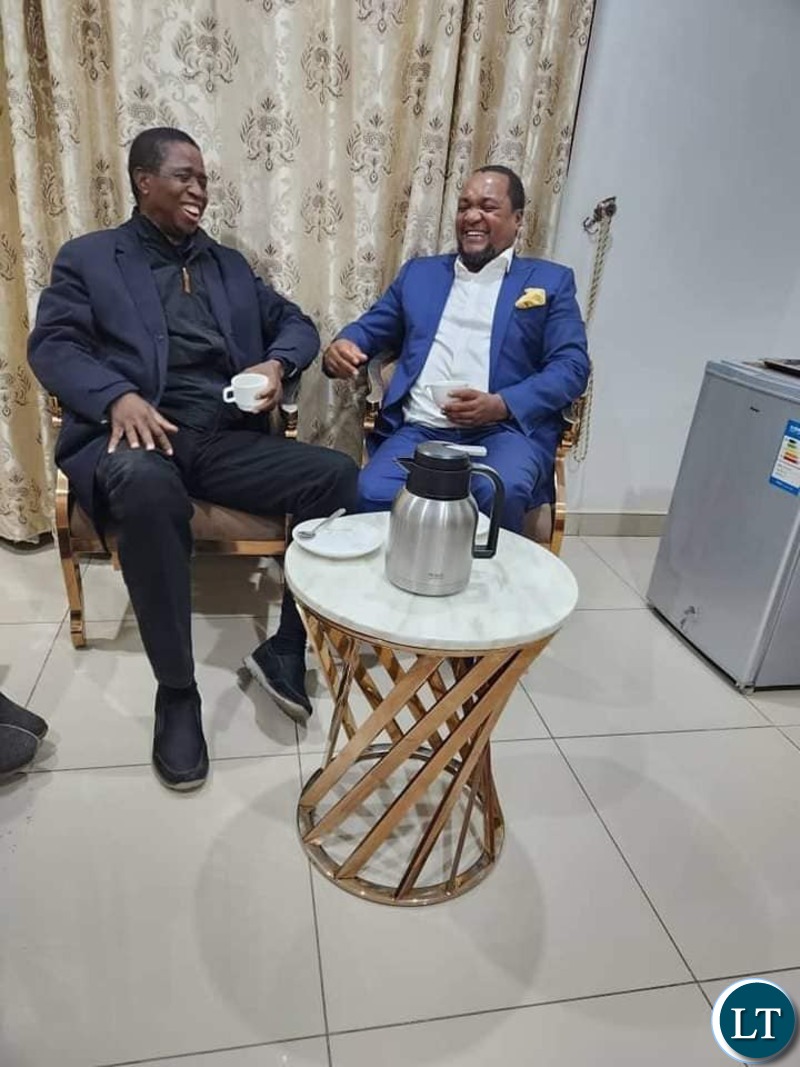
The Patriotic Front (PF) has expelled its President, Miles Sampa. The decision was made by the PF Central Committee and confirmed by PF Secretary General Morgan Ng’ona during a press briefing held in Lusaka.
Mr. Ng’ona attributed the expulsion to Mr. Sampa’s association with leaders of the United Kwacha Alliance and his alleged tendency to make unilateral decisions without the approval of the PF Central Committee.
“The expulsion of Mr. Sampa is a result of his consistent disregard for party protocol and his independent decision-making, which has undermined the unity and integrity of the party,” stated Mr. Ng’ona.
In the wake of Mr. Sampa’s expulsion, the PF Central Committee has appointed Robert Chabinga, the Leader of Opposition in the National Assembly, as Acting President of the party. Mr. Chabinga assured that despite his new role, he will continue to serve as the Leader of Opposition.
“All decisions recently made by Mr. Sampa, including the appointment of Kalulushi Member of Parliament Kampamba Mulenga, are hereby declared null and void,” announced Mr. Chabinga. “Our priority is to restore order and ensure that all actions are in line with the Central Committee’s directives.”
Meanwhile, Miles Sampa responded to the expulsion on his Facebook page, dismissing the Central Committee’s decision and criticizing their actions. “After they fail to get a court injunction, they drink tu junta and start making dreamland pronouncements – lol. I appointed them months ago & they thanked me but now can’t stomach the appointment reversal. Their crazy ranting should be ignored,” Sampa posted.
The PF’s internal conflict marks a significant moment for the party, as it navigates through leadership changes and strives to maintain cohesion ahead of future political challenges.
President Hakainde Hichilema, Hunger is Biblical, but so is Poor Leadership
President Hichilema’s recent assertion that “hunger is biblical” and his astonishment at the lack of understanding from Zambians did not surprise me. This is the same man known for making false promises and spreading misinformation. Since he chose to use the Bible to justify his statement, I will use it to prove him wrong.
President HH referred to the Pharaoh’s dream in the book of Genesis, where the Pharaoh dreamed of seven healthy cows being devoured by seven sickly cows and seven plump ears of grain being consumed by seven thin and scorched ears. Joseph interpreted the dream as a divine warning of seven years of plenty followed by seven years of famine.
However, President HH missed a crucial point. The Pharaoh wisely sought guidance on how to prepare for the disaster, and Joseph, a wise and capable man, advised him to store food during the years of plenty to sustain the nation during the famine. It is the leader’s responsibility to anticipate and plan for hardship, especially food security. Southern Africa has always experienced cycles of drought every 5-7 years, as noted by explorer David Livingstone as early as 1858.
When President HH took office, he inherited millions of metric tons of maize from his predecessor, President Lungu. Instead of using them wisely to ensure food security and prepare for future crises, he quickly sold them off without considering future consequences. Now he questions why Zambians don’t understand that hunger is biblical. Knowing the Bible requires more than just familiarity with a few stories; it requires wisdom and foresight, which President HH lacks.
President HH is known for making reckless statements without consideration and wasting resources while masses starve. Who can live in two State Houses when millions can hardly afford a meal? Instead of acknowledging mistakes, and offering solutions, he criticizes and blames others for his shortcomings. This is not the leadership Zambia needs.
The story President HH referenced shows that the Hebrews became slaves in Egypt because of hunger, exchanging their land for food in Egypt, which led to their enslavement. This should be a cautionary tale for Zambia. Due to poor leadership and mismanagement, our country has become dependent on foreign aid and loans, sacrificing our sovereignty and resources for temporary relief from hunger. Millions of hectares of land are being sold to foreigners like pieces of toilet paper.
The Bible condemns both hunger and poor leadership. Proverbs 28:3 says, “A ruler who oppresses the poor is like a driving rain that leaves no crops.” Proverbs 29:4 states, “By justice a king gives a country stability, but those who are greedy for bribes tear it down.” These verses speak to HH’s heartlessness and Zambia’s current dire situation, where the government has failed to provide economic stability and is plagued by corruption, greed, and food insecurity amidst narcissistic leadership.
I urge President HH to educate himself on biblical interpretation before using it to justify his failures. As a self-confessed Church elder, he should guide and lead others in the right direction, not spread false information and misguided interpretations of the Bible.
Hunger may be biblical, but the bible is critical of poor leadership. Like the Pharaoh, our leaders must seek guidance and make wise decisions for the nation’s benefit, not just their own. Zambians must demand better leadership and hold leaders accountable. Only then can we break free from the cycle of hunger and poor leadership. Ensuring food security for the nation is a constitutional responsibility of the President, but not for HH.
By Kapya Kaoma
Open letter of ZCCM-IH Minority Shareholders to President Hakainde Hichilema
Your Excellency, the President of the Republic of Zambia,
« This is our time… » That is what the bad eggs around you may think. Indeed, according to various corroborating sources, we have learned that these bad eggs are maneuvering and acting against the interests of Zambia.
You are trying to rebuild the Country despite difficulties in particular the shady legal heritage you found. We cannot imagine that you endorse such actions and we assume that you ignore them. It would be tragic again for Zambia if some new Amos Chanda or Kaiser Zulu were able to operate in the shadows, continue to work for their own personal interest and sabotage your hard work. They will inevitably end up embarrassing and discrediting you.
In your inauguration speech at the National Heroes Stadium on 24th August 2021, you proclaimed among other things :
- ” We are determined to free our country from the ills of mismanagement and malpractice, and promote that which is better”
- “The days of political interference in public institutions and parastatals are over”
- “We need morality, integrity and accountability”
This is why we are requesting you to launch thorough investigations and to get rid of these bad eggs without any weaknesses. For our part, investigations will also be carried out shortly following the first cross-referenced information we have received.
Yours faithfully,
Thierry CHARLES
Spokesperson of Minority Shareholders of ZCCM-IH
President Biden Debate Debacle
The President Biden and former President Trump debate had the whole country and the world looking forward to the major event with tremendous expectations, anticipation, and excitement. For months, political pundits, the public, the candidates themselves and other prognosticators spoke so much about who would win the debate and improve their chances of winning the November Presidential election. Whether it is the Superbowl, World Cup soccer match, any crucial championship competition match between teams and individuals, the eyeball test during the first even thirty seconds normally is effective in determining which team or individual will win.
When President Biden walked on to the debate stage and talked for the first thirty seconds, viewers could tell something was terribly wrong with President Biden. His body language was not right. His voice was barely audible. Because candidate Trump goes to all these rallies and is forced to shout or talk loudly, he was fine when he spoke. What went wrong? Where was the sharp, passionate and animated President Biden from the State of the Union address that supporters were expecting?
It is tempting to overthink. But two simplest answers may be that age has caught up with him. When we are born as babies, every week or month makes a dramatic difference in our cognitive and physical growth during the first 12 months up to about 2 years. The next dramatic difference in physical and cognitive growth is between puberty at 14 up to 21 years old. After 70 years of age the ageing process generally accelerates the precipitous decline in physical and cognitive performance. It has been 3 months since President Biden’s State of the Union speech on March 7 2024. At the age of 81 and beyond, it might mean that ageing acceleration may increase in some individuals such as the President.
The second explanation for President Biden’s poor debate performance may be living in the protected White House bubble as president and overcoaching for the debate. He has been President for almost three years and being president isolates and insulates the individual from reality. The President’s assistants overcoaching caused him to have excessive factual information that overwhelmed the perhaps limited and declining cognitive capacity of an 81 year old man.
What will happen next will depend on the known and unknown factors. Outside the debate incident, is President Biden otherwise cognitively still sharp or is there a significant decline? What surprised me the night of the debate was that afterwards, President Biden went to a waffle house and later was at another after-debate event where supporters had gathered. First Lady Dr. Jill Biden introduced the President to the crowd and Biden addressed or talked to the crowd and his voice was loud and normal.
The following day, President Biden addressed a large rowdy political rally in North Carolina. He sounded fired up like he was during the State of Union address earlier in the year. This left me scratching my head as to what had really gone wrong when the President was at the debate? Is this debate debacle so bad that President Biden cannot recover from it? If President Biden is still the same man he was 3 months ago, I am optimistic that age and life experience always triumph over such adversity.
The Republicans, the MAGA base, and candidate Trump may be breaking champagne bottles in celebration of the default debate win. It may be too early to celebrate because the former President did not necessarily hit it out of the park himself with his debate answers which were all predictable lies that he tends to make up as he speaks. Does that give America confidence that he would lead the country better this time if he won the Presidency again? The possibility of the former president winning the presidency with his promise of retribution against his political enemies is the lion or the wolf knocking at the nation’s door.
At this point no one can predict what will happen to the Democrat candidate. But what is clear is that it is too late to change the candidate four months before the elections this November. Besides, the Democrat party at this point cannot change the candidate like buying a soft drink from a vending machine as the logistics of change would be complicated.
By Mwizenge S. Tembo, Ph. D.
Emeritus Professor of Sociology.
You’re doing injustice to mother earth; stop burning bushes!
During his press briefing at State House where he called for prudent utilisation of public resources especially during this critical period of energy and food insecurity induced by the drought, President Hakainde Hichilema bemoaned the culture of bush burning.
How many times are we going to be warned about the dangers of burning bushes or deforestation?The Earth is already warming up, rainfall patterns are changing, and sea levels are rising hence increasing the risk of heatwaves, floods and droughts.
A lot of things had gone in this country; we deserve a lot of schooling. For instance, in the farming block where we’ve a small holding, children have a habit of burning bushes as they hunt for mice during this time of the year as adults equally go on rampage cutting down trees, indiscriminately, for various reasons!
While those of us that haven’t disturbed the environment that much, unless for cultivation purposes of course, get to enjoy the mushrooms, caterpillars and wild fruits (amasuku which unfortunately now face extinction) during the rain season; their land can no longer yield anything and they resort to stealing from us in the night……the very reason why we intend to get a revolver!
This is not the only area where our people need salvation; let’s consider waste management for instance……every other day, we see plastic materials and disposable bottles flying-out of moving vehicles on the highway while residents in the townships have no qualms choking the drainages with garbage and littering the the streets with all manner of rubbish! Little wonder why cholera is a perennial problem in this country.
We don’t surely expect the President to be always addressing such issues. Cabinet ministers; what are you doing to help the President deliver? We expect the one responsible for the environmental portfolio to be in the forefront of raising awareness on the causes and effects of climate change while their local government counterpart must focus on ensuring our people keeping their surroundings clean at all the time.
On our first visit to England, a friend of ours invited us to a McDonald’s outlet……finger licking good! After our feast, we were hastily heading for the exit only to realise our host had remained behind to clear the mess on our table. You can imagine the Ostrich egg on our face!
How many of us walk out of Hungry Lion leaving litter strewn all over the place? How often do we see school going children munching their jiggies and happily discarding empty packets or indeed adults helping themselves behind trees after they’ve had one too many?
We’re doing injustice to mother earth! Let us be good stewards of what God has bequeathed to us.
Prince Bill M Kaping’a
Polical/Social Analyst
Zambia and China agree on some waivers to encourage more Chinese tourists in Zambia
Tourism Minister Rodney Sikumba says China’s vast population provides a huge tourism market for Zambia.
Mr Sikumba says it is for this reason that his Ministry has chosen to partner with the Chinese government for strategic collaboration that will boost the Tourism industry.
He adds that the two countries have consequently coined 2024 as the year of tourism and culture.
The Minister who was speaking shortly after a tour of Lusaka National Park with visiting Chinese Minister of Veterans Affairs Pei Jinjia, further explained that Zambia and China have agreed on some waivers to encourage more Chinese tourists in Zambia.
Under the deal, the two countries are strategising on having direct flights between China and Zambia as well as the removal of visa restrictions for Chinese tourists.
Mr Sikumba also shared that the two countries have agreed for China to help Zambia with infrastructure in the tourism sector and has called on all players in the hospitality sector to improve on service delivery in order to meet the demand that will be created by the growth in tourist inflows.
Chinese Minister of Veterans Affairs Pei Jinjia has concluded his four day visit to Zambia


